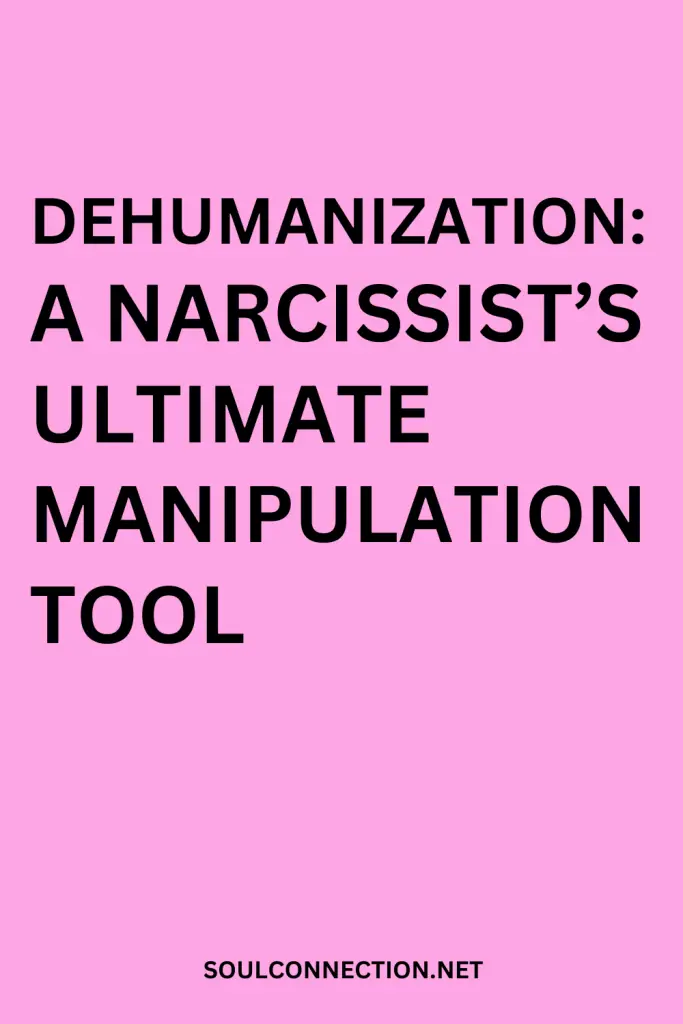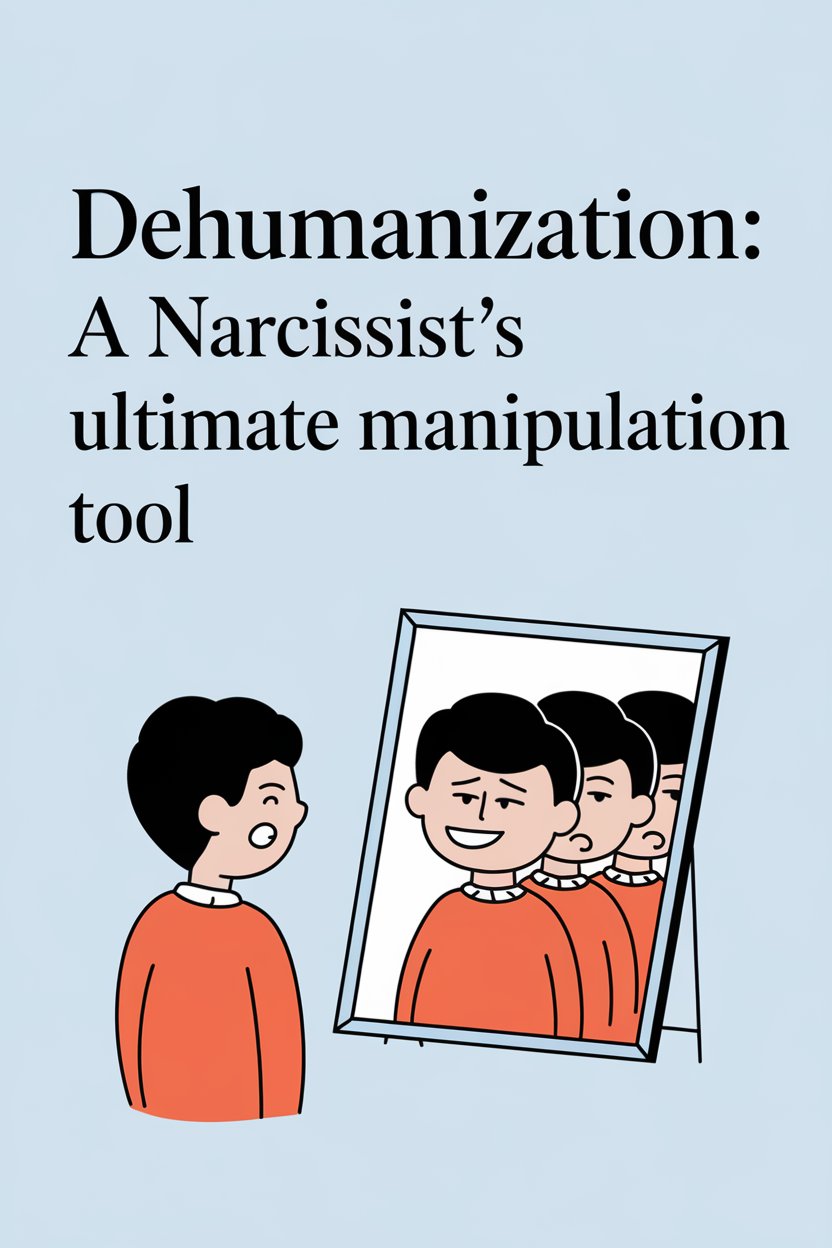Ever had a conversation that left you feeling like a piece of furniture—useful, silent, and entirely overlooked? Congratulations. You’ve just brushed up against one of narcissism’s all-time greatest hits: dehumanization.
No, it’s not a Marvel villain, but it sure can leave you feeling like you’re in the middle of a psychological action movie (minus the superpowers and with a lot more sighing).
This isn’t just about bruised egos or quirky personalities. Dehumanization is a power move, a game of psychological chess where the narcissist doesn’t just want to win—they want to make sure you forget you were ever a player in the first place.
Let’s pull the mask off this tactic and see what’s really going on behind those dead-eyed “I’m always right” stares.
What Dehumanization Really Means
The term sounds dramatic, but the mechanics are simple: the narcissist strips you of your agency, identity, or basic humanity in order to control, dominate, or exploit you.
It’s like being demoted from “partner” to “appliance”—except your only setting is “serve the narcissist.”
This isn’t always overt. Sometimes it’s loud and public; other times, it’s so subtle you don’t notice until you find yourself apologizing to a potted plant for being in its way.
Dehumanization doesn’t just erode your self-esteem; it can warp your entire sense of reality, making you question if you’re even worthy of basic respect.
The Many Faces of Narcissistic Dehumanization
Dehumanization might be the narcissist’s ultimate party trick, but it’s no one-trick pony. Here’s what it can look like on a regular Monday (or, let’s be honest, any day ending in “y”).
Emotional Flatlining
Ever poured your heart out, only to be met with a blank stare or a quick subject change to their favourite topic (themselves, obviously)? That numb, cold response is dehumanization with a bow on top.
Your feelings become background noise, a mild inconvenience in the opera of their own drama.
Objectification and Tokenism
Narcissists don’t see people, they see roles—or better yet, props. You might be “the supportive partner,” “the trophy spouse,” or “the walking, talking ATM.”
It’s less about who you are and more about what you can do for them. And heaven help you if you try to rewrite your part in the script.
Blame and Scapegoating
Somehow, everything is your fault—even the stuff that happened before you met. Did it rain on their birthday? Must be your negative energy.
Dehumanization allows for wild levels of blame-shifting because, well, you’re not seen as a full person with your own narrative.
Gaslighting with a Twist
When your humanity is denied, so is your reality. That’s gaslighting with a side of dehumanization: “You’re too sensitive.” “You’re imagining things.” “No one else would put up with you.”
Suddenly, you’re a malfunctioning robot, not a person with valid experiences.
Humiliation and Mockery
Sarcasm has its place (hey, I’m living proof), but with narcissists, it transforms into a weapon. Eye-rolling, name-calling, or public embarrassment serve one purpose: to shrink you down to size.
If you’re laughing, it’s probably not with them, but at yourself—because that’s exactly how they want it.
Why Narcissists Rely on Dehumanization
Empathy is a foreign language to narcissists, and they forgot to download the translation app. Dehumanizing people is less a conscious choice and more a survival mechanism. Here’s why:
- Control: If you stop feeling like a full human, you’re easier to manipulate. Easy peasy.
- Avoiding Responsibility: If you’re “less than,” your needs and feelings don’t count. Problem solved (for them).
- Self-Elevation: By reducing others, narcissists feel bigger, better, more deserving. They’re basically building a throne out of other people’s dignity.
The Subtle Methods Nobody Talks About
Not all dehumanization involves yelling or grand gestures. Subtle techniques do just as much damage—and are a lot harder to spot at first.
Stonewalling
Refusing to engage, answer, or even acknowledge your existence during an argument? That’s not just being “quiet.” It’s an erasure of your right to communicate and be heard.
Withholding Affection
Affection is juggled like a prize for good behaviour, and withdrawn anytime you dare to have your own needs or opinions. Suddenly, love is conditional, and you’re on a never-ending audition.
Micro-Invalidations
Tiny put-downs, “jokes,” or dismissive comments chip away at your identity. “You’re always so dramatic.” “No one else would care about this.” Each one is a pebble in your shoe, but after a few miles, you’re limping.
How Dehumanization Warps Your Reality
This isn’t about a little snark here and there. When repeated, dehumanization rewires the way you see yourself, your relationship, and even the world outside.
Self-Worth Takes a Hit
Start believing you don’t deserve respect, and watch how quickly your boundaries vanish. That’s the point: dehumanization isn’t just about them feeling powerful, it’s about making sure you don’t even try to stand up straight.
Emotional Numbness
People in narcissistic relationships often report feeling “hollow” or “invisible.” That’s not melodrama. It’s a survival adaptation. When you’re routinely denied your feelings, it’s easier to just stop having them—at least outwardly.
Isolation Becomes the Norm
Sharing what’s happening feels pointless or embarrassing. Plus, narcissists often actively undermine your other relationships, making it even harder to get an outside perspective or support.
Spotting the Red Flags Early
Nobody walks around wearing a “Hello, I’m a Narcissist” badge. Still, certain patterns scream “danger ahead.”
- Consistent invalidation of your feelings
- Only their needs matter
- You’re blamed for their emotions or actions
- Public humiliation disguised as “jokes”
- You feel lonelier with them than you did single
If any of these sound like your Tuesday, it’s time to take a closer look.
Getting Your Humanity Back
Crawling out from under a narcissist’s boot isn’t exactly a spa day, but it’s doable—promise.
Reconnect with Reality
Journaling, therapy, or just a brutally honest chat with a friend can help you spot patterns and reclaim your experience. Sometimes you need a second set of eyes to confirm, “No, you’re not crazy.”
Set Small Boundaries
Don’t try to erect the Great Wall of China overnight. Start with little things: “I’m not available to talk right now,” or, “Please don’t joke about that.” Each small win is a brick in your rebuilt self-respect.
Find Your People
Isolation is a narcissist’s dream. Reach back out to friends, family, or support groups—anything that reminds you you’re more than just someone else’s emotional footstool.
Practice Self-Compassion
If your inner monologue sounds like a drill sergeant, give it the day off. Self-dehumanization is real, and it’s time to retire the habit. Try kindness, even if it feels weird at first.
Seek Professional Support
Therapists with experience in narcissistic abuse can help untangle the mess and fast-track your healing. No shame in asking for directions out of a psychological maze.
When They Try to Rehumanize You (Sort Of)
Narcissists can smell independence like sharks smell blood in the water. Don’t be surprised if, when you start pulling away, you’re suddenly treated like royalty—flowers, compliments, maybe even a half-hearted apology.
This is less about genuine change and more about panic at losing their favourite source of supply. If the “new leaf” lasts about as long as a British summer, you’ve got your answer.
How to Protect Yourself Going Forward
The best revenge is living well—and staying alert. Here’s how to keep your humanity intact in any relationship:
- Trust your gut: If you constantly feel less-than, something’s off.
- Keep boundaries non-negotiable: Those aren’t just for other people.
- Refuse to play the “fixer”: Narcissists love a good project, especially if it means you’re too busy to notice your own needs.
- Stay connected to the outside world: Your reality hasn’t retired, no matter what they tell you.
Rewriting the Script
Dehumanization might be a narcissist’s go-to trick, but it’s not the end of your story. Every time you say “no,” call out a put-down, or even just remind yourself that you are, in fact, not a household appliance, you chip away at their control.
It isn’t about becoming bulletproof; it’s about remembering you don’t have to play a role in someone else’s one-man show.
Grab the popcorn and watch from the audience for a change.
And if you’re feeling brave, write yourself back into the narrative—this time as the main character.


